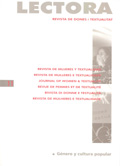<i>Scream</i>, cultura popular y el feminismo de la tercera ola: "Yo no soy mi madre"
Resumen
This paper analyzes Wes Craven’s horror trilogy Scream; the trilogy, like all popular texts, is riddled with contradictions about women’s representation that beg a careful analysis based on an informed understanding of media culture and representation, of history, and of the issues that matter to young women today. My reading of the film draws up the connections between Third Wave feminism and popular culture in order to show how these films provide a rich opportunity to study the contradictions and possibilities of feminism in a postmodern age. The purpose here is not to mount an unconditional defense of popular culture, but to argue that women who care about the next generation of girls need to learn more about the popular texts they're drawn to. If a productive conversation is going to happen among women of all ages about the future of the feminist movement, it will have to take place on the terrain of popular culture where young women today are refashioning feminism toward their own ends.Descargas
Publicado
Cómo citar
Número
Sección
Licencia
Los autores y las autoras conservan los derechos de autoría y otorgan a Lectora: revista de dones i textualitat el derecho de difusión. La obra estará disponible simultáneamente bajo una Licencia de Reconocimiento-NoComercial-SinObraDerivada de Creative Commons que, si no se indica lo contrario, permite compartir la obra con terceros, siempre que estos reconozcan la autoría y la publicación inicial en esta revista.Los autores y autoras son libres de hacer acuerdos contractuales adicionales independientes para la distribución no exclusiva de la versión de la obra publicada en la revista (como la publicación en un repositorio institucional o en un libro), siempre que se reconozca la publicación inicial en esta revista.Se alienta a los autores y autoras a publicar su obra en línea (en repositorios institucionales, temáticos o en su página web, por ejemplo) con el objetivo de conseguir intercambios productivos y hacer que la obra obtenga mayor difusión y citas (véase The Effect of Open Access, en inglés).




